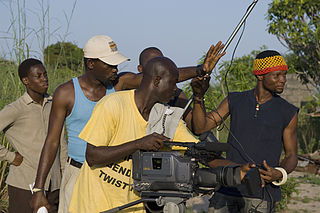Related Research Articles

The film industry or motion picture industry comprises the technological and commercial institutions of filmmaking, i.e., film production companies, film studios, cinematography, animation, film production, screenwriting, pre-production, post-production, film festivals, distribution, and actors. Though the expense involved in making films almost immediately led film production to concentrate under the auspices of standing production companies, advances in affordable filmmaking equipment, as well as an expansion of opportunities to acquire investment capital from outside the film industry itself, have allowed independent film production to evolve.

The cinema of Nigeria, often referred to informally as Nollywood, consists of films produced in Nigeria; its history dates back to as early as the late 19th century and into the colonial era in the early 20th century. The history and development of the Nigerian motion picture industry is sometimes generally classified in four main eras: the Colonial era, Golden Age era, Video film era and the emerging New Nigerian cinema era.

Cinema of Africa covers both the history and present of the making or screening of films on the African continent, and also refers to the persons involved in this form of audiovisual culture. It dates back to the early 20th century, when film reels were the primary cinematic technology in use. During the colonial era, African life was shown only by the work of white, colonial, Western filmmakers, who depicted Africans in a negative fashion, as exotic "others". As there are more than 50 countries with audiovisual traditions, there is no one single 'African cinema'. Both historically and culturally, there are major regional differences between North African and sub-Saharan cinemas, and between the cinemas of different countries.

This Is Nollywood is a 2007 Nigerian documentary film by Franco Sacchi and Robert Caputo, detailing the Nigerian film industry, much along the same lines as the acclaimed 2007 documentary Welcome to Nollywood by Jamie Meltzer
Welcome to Nollywood is a 2007 documentary film about the Nigerian movie industry, directed by Jamie Meltzer. It premiered at the Full Frame Documentary Film Festival, and also played at the Avignon Film Festival and the Melbourne International Film Festival in the summer of 2007.
Ben Addelman is a Canadian filmmaker. He is known for directing four documentaries: Discordia, Bombay Calling, Nollywood Babylon, and Kivalina vs. Exxon. Besides directing, he is known for work as a cinematographer, screenwriter and sound designer.
Zina Saro-Wiwa is a Brooklyn-based video artist and filmmaker. She makes video installations, documentaries, music videos and experimental films.

Kunle Afolayan is a Nigerian actor, producer and director. He is widely credited for elevating the quality of Nollywood movies through larger budgets, shooting on 35mm, releasing in cinemas, and improving cliché Nollywood storylines. After starting his film career as an actor in the 1999 political drama Saworoide, Afolayan made his directorial debut in 2006 with Irapada, a Nigerian supernatural thriller, which won the Africa Movie Academy Award for Best Film in an African Language. His follow-on directing credits include The Figurine, Phone Swap, October 1, and Citation. October 1 was the winner of 16 major African movie awards in 2015 and the second highest grossing Nigerian film in Nigerian cinemas at the time of its release, a feat Afolayan was to repeat two years later with The CEO. In 2021, the director signed a three-picture deal with Netflix. Swallow, the screen adaption of Sefi Atta's book of the same name was the first to be released in October 2021, followed by Aníkúlápó, an epic Nigerian fantasy released in September 2022. Afolayan has described the work as a "Game of Thrones recreated in Nigeria but with a better representation of our culture”. Eleven days after its release, it was the #1 most-watched non-English Netflix original film.
Michelle Bello is a British Nigerian film director and film producer. She is also CEO of a Nigerian-based entertainment and publishing company, Blu Star Entertainment Limited. Bello was born in London, England.

Jeta Amata is a Nigerian filmmaker, born on August 21, 1974, to popular Nigerian actor Zack Amata. He comes from a family of veteran filmmakers including Ifoghale Amata, Zack Amata and Fred Amata. Growing up in the film industry, following his family's passion for film, Jeta produced and directed his first film Glamour Boyz at the age of 21, making it no surprise when he began to rise in the world of film and entertainment.
Mahmood Ali-Balogun is a Nigerian filmmaker, cultural worker and the managing director of Brickwall Communications Limited. He directed the multiple award-winning film 'Tango With Me'. He is the Chairman of the Audio Visual Rights Society (AVRS) of Nigeria (2).

Golden Age or Golden era are terms used in Nigerian film history to designate the motion picture industry of Nigeria from the late 1950s to the late 1980s. It captures the mode of visual and sound production, as well as the method of distribution employed during this period. This period began with the formal recognition of the Nigerian Film Unit as a sector in 1954, with the first film entirely copyrighted to this unit being Fincho (1957) by Sam Zebba.

Nollywood, a portmanteau of Nigeria and Hollywood, is a sobriquet that originally referred to the Nigerian film industry. The origin of the term dates back to the early 2000s, traced to an article in The New York Times. Due to the history of evolving meanings and contexts, there is no clear or agreed-upon definition for the term, which has made it a subject of several controversies.

Tope Oshin is a Nigerian television and film director, producer and casting director, listed as one of the most influential Nigerians in film in 2019. In 2015 Pulse magazine named her as one of "9 Nigerian female movie directors you should know" in the Nollywood film industry. and in March 2018, in commemoration of the Women's History Month, Tope was celebrated by OkayAfrica as one of the Okay100 Women. The interactive campaign celebrates extraordinary women from Africa and the diaspora making waves across a wide array of industries, while driving positive impact in their communities and the world at large.

Moses Inwang is a Nigerian film director, producer, editor and screenwriter best known for classic films in the Nollywood mainstream that speak to societal ills and nagging live issues rarely documented in Nigerian movies. Inwang's first outstanding recognition came in 2012 when he directed the psychological thriller Torn, also produced by him, and released in cinemas nationwide in 2013. With multiple nominations, award and recognition bagged from that movie, he went on to direct and produce other hits like Damage, Cold Feet, Stalker, Last 3 digits, Alter Ego, Crazy People, American Driver, Unroyal and lastly Merry Men 2; Ayo Makun (AY)’s blockbuster film, which emerged the 2nd highest-grossing movie of 2019 in Nigeria with a sum of 240 million.
Adekunle “Nodash” Adejuyigbe, is a Nigerian film maker and producer; He has served as a producer and executive producer for several documentaries and commercials for international organisations and is considered one of the most outstanding directors and one of the most sought after cinematographers of the New Nigerian Cinema.

Tanzania's film industry, also known as Swahiliwood or Bongo movie and Bongowood, was established around 2001.
Toka McBaror is a Nigerian filmmaker, producer, movie and music video director born, raised and is based in Kaduna, Kaduna State, Nigeria but originally from Delta State. He received an award nomination for "Kada River" at the 2018 Toronto International Nollywood Film Festival in Canada, 6 award wins for the movie, Lotanna including: "Best Film", "Best Director", "Best Cinematography", "Best Art Director", "Best Costume" and "Best Sound Editor" at the 2017 Golden Movie Awards.
Imoh Umoren, is a Nigerian filmmaker who primarily makes indie films. He is most notable as the director of the 2017 film Children of Mud. Umoren is considered the first filmmaker to make a silent black and white film in the Nollywood film industry.
Steve Gukas is a Nollywood filmmaker, director and producer who believes that films should be used to address the ills of the society.
References
- ↑ "Franco Sacchi Filmmaker". ted. Retrieved 30 October 2020.
- ↑ "Franco Sacchi". British Film Institute. Archived from the original on November 30, 2021. Retrieved 30 October 2020.
- ↑ "Franco Sacchi: PRODUCER, DIRECTOR, CINEMATOGRAPHER". MUBI. Retrieved 30 October 2020.
- ↑ "Franco Sacchi: Cambridge, MA, USA". vimeo. Retrieved 30 October 2020.
- ↑ "Franco Sacchi: A tour of Nollywood, Nigeria's booming film industry". ted2srt. Retrieved 30 October 2020.
- 1 2 "About Franco Sacchi". Franco Sacchi official website. Retrieved 30 October 2020.